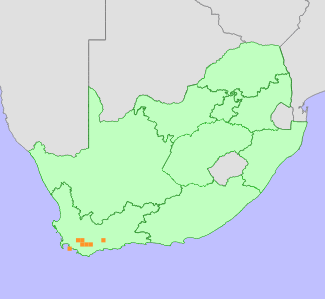|
Scientific Name | Leucadendron nervosum E.Phillips & Hutch. |
Higher Classification | Dicotyledons |
Family | PROTEACEAE |
Common Names | Silky-ruff Conebush (e) |
National Status |
Status and Criteria | Least Concern |
Assessment Date | 2020/07/19 |
Assessor(s) | A.G. Rebelo & H. Mtshali |
Justification | This species is at present a popular cut flower and is known to occur in one extensive subpopulation on the northern slopes of the Riviersonderend Mountains and another smaller, isolated subpopulation in the Langeberg Mountains in South Africa. Wild plants are harvested, but the wild population has also greatly been increased when harvesters sowed seeds among the wild population. The population of this species is currently being maintained by its popularity as a cut flower, but should be monitored as it may decline if other species become favoured. The habitat is threatened by spreading alien invasive plants however these are not yet causing the population to decline. It has an extent of occurrence (EOO) of 1173 km² and an area of occupancy (AOO) of 104 km², there are between 10 and 15 locations known. It is therefore listed as Least Concern. |
Distribution |
Endemism | South African endemic |
Provincial distribution | Western Cape |
Range | Leucadendron nervosum has a limited distribution in mountains of Western Cape, South Africa, where it occurs from Riviersonderend to Langeberg Mountains. |
Habitat and Ecology |
Major system | Terrestrial |
Major habitats | North Langeberg Sandstone Fynbos, North Sonderend Sandstone Fynbos |
Description | It grows on north-facing sandstone slopes, 1100-1350 m. Mature individuals are killed by fires, and only seeds survive. Wind-dispersed seeds are stored in fire-resistant inflorescences, and released after fires. It is dioecious, with insect-pollinated male and female flowers occurring on separate plants. |
Threats |
| The population is currently being actively managed and maintained by the cut flower industry and is stable or increasing. However, due to its limited distribution range and small population, it is vulnerable to alien invasive plants that are spreading and increasing in its habitat in the Langeberg and Riviersonderend Mountains, the impacts of invasive species should be monitored to determine if they are causing the population to decline. |
Population |
This species is known from nine dense natural subpopulations, but it has been extensively planted in parts of the Riviersonderend Mountains. The Langeberg subpopulations are small and isolated, consisting of less than 200 plants, whereas large and extensive subpopulations occur on the northern slopes of Riviersonderend mountain. The population is stable or increasing due to active management by the cut flower industry.
|
Population trend | Stable |
Conservation |
| This species is marginally protected in the Riviersonderend and Greyton Nature Reserves, and in the Boosmansbos Nature Reserve, however the majority of the population occurs on private land. |
Assessment History |
Taxon assessed |
Status and Criteria |
Citation/Red List version | | Leucadendron nervosum E.Phillips & Hutch. | NT A3d+4d | Raimondo et al. (2009) | | Leucadendron nervosum E.Phillips & Hutch. | Rare | Hilton-Taylor (1996) | | Leucadendron nervosum E.Phillips & Hutch. | Rare | Hall et al. (1980) | |
Bibliography |
Goldblatt, P. and Manning, J.C. 2000. Cape Plants: A conspectus of the Cape Flora of South Africa. Strelitzia 9. National Botanical Institute, Cape Town.
Hall, A.V., De Winter, M., De Winter, B. and Van Oosterhout, S.A.M. 1980. Threatened plants of southern Africa. South African National Scienctific Programmes Report 45. CSIR, Pretoria.
Hilton-Taylor, C. 1996. Red data list of southern African plants. Strelitzia 4. South African National Botanical Institute, Pretoria.
Manning, J.C. and Goldblatt, P. 2012. Plants of the Greater Cape Floristic Region 1: The Core Cape Flora. Strelitzia 29. South African National Biodiversity Institute, Pretoria.
Raimondo, D., von Staden, L., Foden, W., Victor, J.E., Helme, N.A., Turner, R.C., Kamundi, D.A. and Manyama, P.A. 2009. Red List of South African Plants. Strelitzia 25. South African National Biodiversity Institute, Pretoria.
Rebelo, T. 2001. Sasol Proteas: A field guide to the proteas of southern Africa. (2nd ed.). Fernwood Press, Vlaeberg, Cape Town.
|
Citation |
| Rebelo, A.G. & Mtshali, H. 2020. Leucadendron nervosum E.Phillips & Hutch. National Assessment: Red List of South African Plants version 2024.1. Accessed on 2026/02/11 |
 Comment on this assessment
Comment on this assessment

